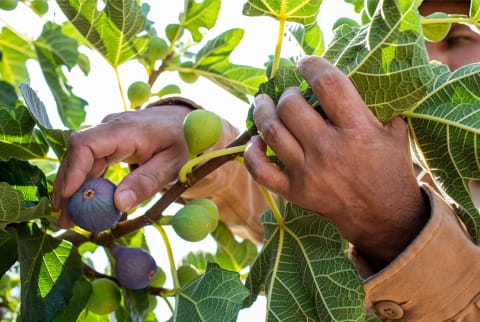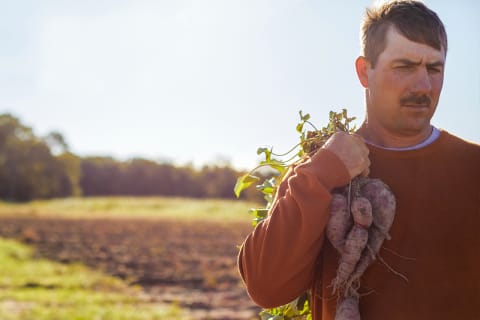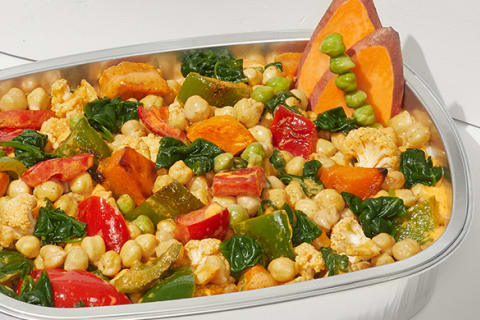Advertisement
Do You Know Where Your Fruits & Veggies Come From? Here's Why You Should

These days, everyone is in pursuit of feeling good and living well. But no matter where we wander in the world of well-being or what kind of lifestyle unfolds, the fundamental importance of eating more fruits and veggies is forever.
Fruits 'n' veggies: Nutrition 101
Ever since we were kids (scooching broccoli around our plates), we've understood fruits and vegetables (FNV) as the baseline of any healthy diet. But we tend to forget why. Fruits and vegetables are full of vitamins and minerals that our body needs but can't produce on its own. They're a top source of dietary fiber, the benefits of which include the prevention of type 2 diabetes, cardiovascular disease, and colon cancer1. Whether it's potassium2 helping our cells function, vitamin C3 as an antioxidant source, or folate to make DNA—a colorful bowl of earth's finest is really the starting point of all-things-healthy.
So how many FNV should we really be eating? A recent study indicates that five servings a day seems to be the sweet spot, and the more diverse the fruits and veggies on your plate, the better. That quota can be easy to reach with delicious and nutritious food from Daily Harvest—like their sustainably sourced Smoothies, Flatbreads, or brand-new Harvest Bakes. Eating plenty of FNV is #1 when it comes to nutrition, but there's also another factor to consider here: where they come from. Knowing the origins of our produce is one of the best ways we can take our health into our own hands.
Where your fruits and veggies come from… And why you should care.
We live in a world that's largely designed around convenience, and our industrialized food system is no exception. This system has made it easy for us to head to the store and secure an apple when the craving strikes, but there's more to that story. The majority of FNV are grown through conventional agriculture (only 1% of U.S. farmland is farmed organically). Conventional agriculture regularly incorporates synthetic chemicals, antibiotics, or genetic modification and relies on processes that lead to soil depletion, greenhouse gasses, and exploitation of local farmers.
Fruits and vegetables that come from an organic farm, on the other hand, are grown using practices that are fairer to the farmers, our bodies, and the planet. Organic farming uses processes that keep nature in mind, like composting and natural fertilizers to improve the health of the soil and biodiversity of the ecosystem. If it sounds promising—it is. But it gets better. There's a growing focus on rehabilitation and conservation in agriculture. Practices that improve the health of the soil and increase biodiversity are actually helping to reverse climate change by restoring the soil and our planet's natural biodiversity.
How to get the best fruits and vegetables (for you AND the planet).
Compared side by side, it's clear that organic farming and practices that focus on renewing and restoring ecosystems are aligned with a more promising future of food. But what steps can we take to ensure our FNV are coming from these responsible sources? It can be a bit tricky—but these four tips will show you the way:
1. Support brands that source from sustainable farms.
We don't always have a local farmers market to hit up (especially in the dead of winter). But we can stock our kitchen with delicious foods that make it easier to eat more FNV, and from a source that nourishes the planet too. Daily Harvest is a perfect example. They offer tons of uniquely nourishing, chef-crafted options that store in your freezer and can be made in a matter of minutes. Daily Harvest sources their farm-frozen fruits and veggies with the highest quality nutrition in mind, through organic and regenerative farms. Meaning, all you have to do is eat.
2. Shop locally at farmers markets.
There's nothing better than passing a weekend afternoon at the farmers market, surrounded by vibrant and nutritious foods. But it's more than a leisurely activity—this is your chance to connect (sometimes face-to-face) with where your food comes from! At the farmers market, it's easy to ensure that your FNV are organic and/or locally grown because you can speak directly to the farmer. You may even get to know that person behind the crate of beets.

3. Shop organic when you can.
If you pay closer attention at the grocery store, most produce has signs that indicate where it's from. That's because retailers are required by law to list the origin of certain commodities. But unfortunately, while you may know that mango is from Mexico—it's next to impossible to know which farm. Instead of going down a rabbit hole in the produce section, shop organic when you can. According to the USDA, produce with a USDA organic label "is certified to have grown on soil that had no prohibited substances applied for three years prior to harvest. Prohibited substances include most synthetic fertilizers and pesticides4." Some stores will even carry local produce with the farm information listed so that you can read up on their practices!
4. Grow your own food.
Growing your own food is obviously the best way to know exactly where your produce comes from. But not all of us have a spacious backyard to make that happen! Start small by growing your own herbs indoors or with potted fruits and veggies like tomatoes and peppers. Or, if you have space for a full-on garden, by all means!
The future of food.
By sourcing our produce more responsibly and eating the recommended five servings of FNV a day, we can each participate in creating a more well-fed future. And with Daily Harvest, that can be as convenient and delicious as a Chickpea + Coconut Curry Harvest Bake or a bright Strawberry + Peach Smoothie. The wellness world may always be changing, but one thing stays true: Every day can be made a little brighter with responsibly sourced fruits and vegetables.
4 Sources
- https://www.ncbi.nlm.nih.gov/pmc/articles/PMC3399949/
- https://ods.od.nih.gov/factsheets/Potassium-HealthProfessional/
- https://ods.od.nih.gov/factsheets/VitaminC-HealthProfessional/#:~:text=Ongoing%20research%20is%20examining%20whether,stress%20plays%20a%20causal%20role.
- https://www.usda.gov/media/blog/2012/03/22/organic-101-what-usda-organic-label-means#:~:text=Produce%20can%20be%20called%20organic,most%20synthetic%20fertilizers%20and%20pesticides.

Why Nutrition Is Key To Changing Your Relationship With Alcohol
Brooke Scheller, DCN, CNS

Why Alcohol Sabotages Your Gut Health & How To Get Back On Track
Brooke Scheller, DCN, CNS

Why Nutrition Is Key To Changing Your Relationship With Alcohol
Brooke Scheller, DCN, CNS

Why Alcohol Sabotages Your Gut Health & How To Get Back On Track
Brooke Scheller, DCN, CNS

Why Nutrition Is Key To Changing Your Relationship With Alcohol
Brooke Scheller, DCN, CNS

Why Alcohol Sabotages Your Gut Health & How To Get Back On Track
Brooke Scheller, DCN, CNS

Why Nutrition Is Key To Changing Your Relationship With Alcohol
Brooke Scheller, DCN, CNS

Why Alcohol Sabotages Your Gut Health & How To Get Back On Track
Brooke Scheller, DCN, CNS


















